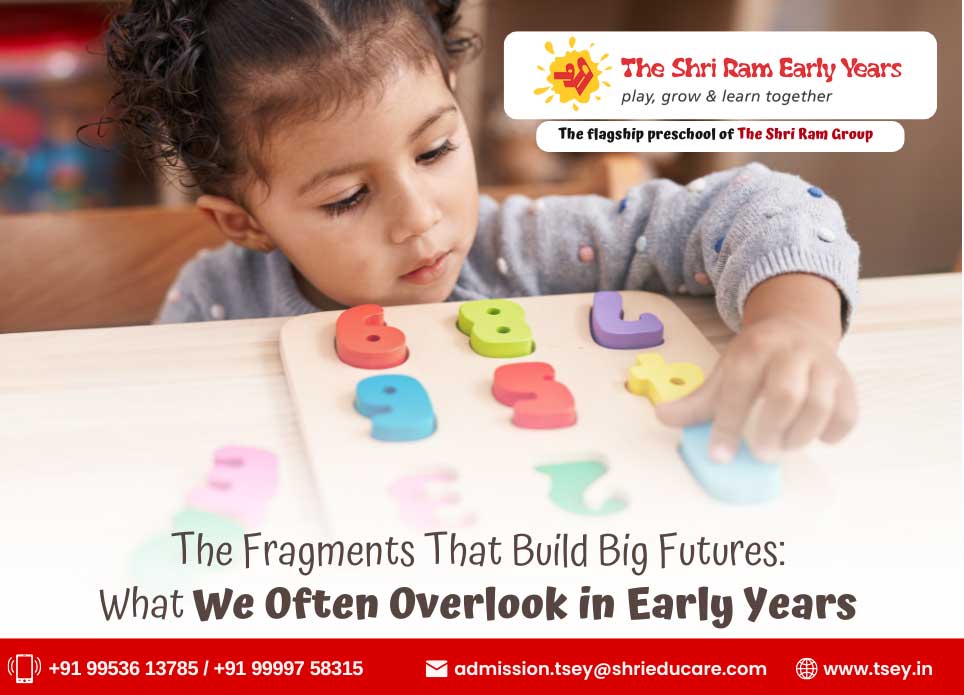
In a child’s early years, there’s a quiet kind of magic. Not the fireworks type, but the one that establishes itself quietly, silently molding personalities, thoughts and values. These are the days of sticky fingers and infinite questions and imaginary worlds and out-loud giggles. But these years, for a parent, also come with the persistent roar of worry. Are we doing enough? Are we doing it right?
In the bustle of parenting to-do lists – nutrition, safety, milestones – what is frequently overlooked is something much more intangible: the environment their children are growing up in. Not the architectonic one alone, but the affective, the cognitive and the social setting that envelops learners like invisible scaffolding.
Why “Just Play” Is Not Just Play?
You can walk by your child having a tea party with her stuffed animals and hear, “Oh, she’s just playing.” But at that moment, your child is learning empathy, language, turn-taking and storytelling – all at once. When they balance blocks, or put together a simple puzzle, they’re building more than towers – they’re building patience, perseverance and problem-solving skills.
Yet, play isn’t automatic. It flowers most in the right room – in a place where curiosity is nurtured, not redirected; where exploration is a reason for applause and not for cleanup.
Small Interactions Make a Big Difference
In adult life, a “productive day” generally means accomplishing something quantifiable. Yet in a child’s world, success means tying shoelaces, saying “thank you” on their own, or finally drawing a recognizable tree. What keeps these wins going is the thousands of micro-moments: a patient smile, a “try again,” a bedtime story when you’re exhausted.
Children learn more from our tone than our words, more from our behavior than our directives. And so, the early learning environment – and particularly outside the home – needs to be more than a safe, structured place. It needs to be empathetic, instinctual and humming with imagination.
The Unsung Role of Routine
And ironically, when it comes to our kids, we pursue novelty – new toys, new experiences – but it’s routine that provides security. The predictable rhythm and rhythm, familiar noses and familiar scenery provide the emotional stability they need to thrive.
A high-quality, early learning space acknowledges this need. It doesn’t overwhelm, but it also doesn’t skimp. It is a safe haven for freedom in structure. And that is part of why some institutions are not just functional, but foundational. That’s what parents mean when they say they found one of the best preschools in Gurgaon – they found a school that knows this delicate balance.
Trust: The Connection Between You and Their World
For a parent, putting your child’s hand in someone else’s for the first time feels almost counterintuitive. You want eyes that look at your child the way you do, voices that guide but don’t drown out, spaces that care but don’t cling.
Trust is the coin of the realm in early education. And the trust you have in those caregivers or educators shouldn’t derive from glossy brochures or tall claims – it should come from how you feel when you walk into that space. Does it feel kind? Thoughtful? Do the children seem heard?
The best daycare in Gurgaon, or anywhere, is not judged by air-conditioning or cameras – it is judged by the culture of care, the training, and the consistency of experience it provides.
Confidence More Than Readiness
Too much focus on “school readiness” – knowing letters, numbers, rhymes. Learning about confidence readiness, however. Communication readiness? Emotional readiness? The world your children will inherit will require far more than academic skills. It requires tenacity, ingenuity, compassion, and teamwork.
It’s time we reframe the question from “Is my child ready for school?” to “Is the world ready for my child’s uniqueness?”
Conclusion: What Should You Look For in a Preschool?
Honestly, there is no one right answer. Every child is a universe. But many signs are universal: teachers who spend more time listening than talking, classrooms that resemble story books rather than showrooms, and a curriculum that celebrates uniqueness over uniformity.
Sometimes, it’s not about finding a place that teaches your child everything, but a place that acknowledges everything your child already is – and builds from there.
The Shri Ram Early Years (TSEY) stands out in a crowded sea not because it says it does, but because parents feel it does. The preschool community at TSEY is a favourite among parents, owing to its philosophy of respecting the child and following best global practices. TSEY is one of the perfect choices in the list of best preschools in Gurgaon, especially, for families looking for a loving and caring environment as much as learning, a place where even the smallest things are never missed – because they’re the ones that space everything.
After all, it’s not about preparing children for the world, it’s about preparing the world to be worthy of them.






